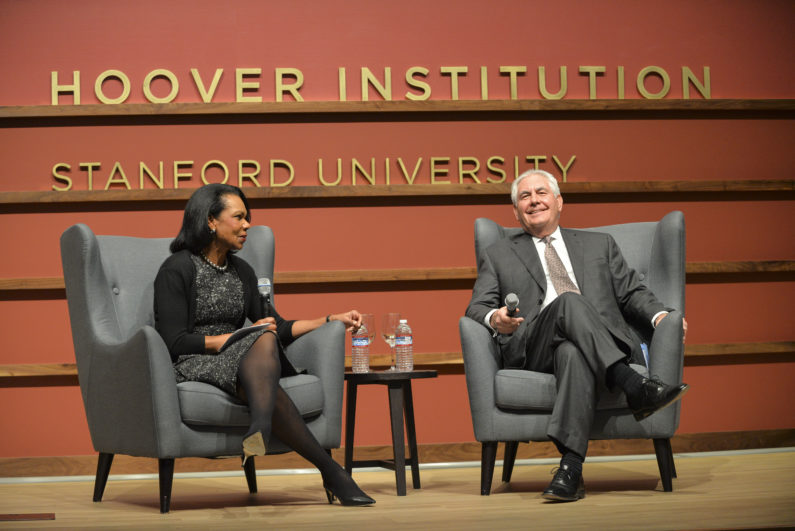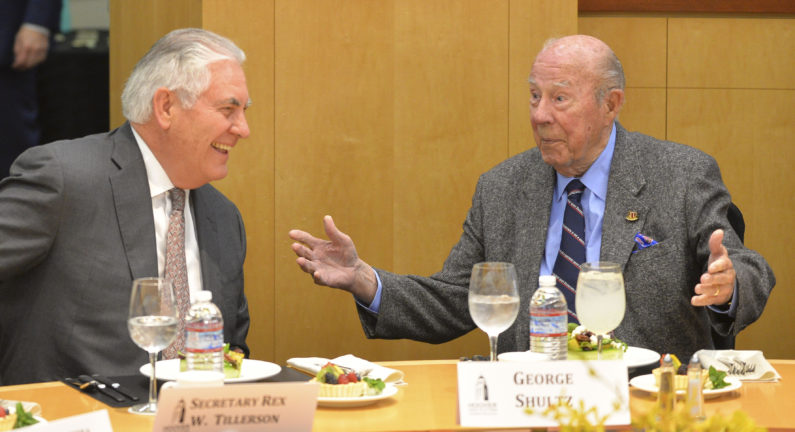U.S. wants peace, stability in Syria, Secretary of State Rex Tillerson says in policy speech at Stanford
Secretary of State Rex Tillerson visited the Hoover Institution on Wednesday to give a speech on U.S. policies in Syria. He said a continuing presence of U.S. troops in the country is needed to stabilize the area.
In its vision for Syria, the United States wants to see a peaceful, independent country, free of weapons of mass destruction, that could welcome back millions of Syrians displaced by the past years of war, U.S. Secretary of State Rex Tillerson told a Stanford audience on Wednesday.

Condoleezza Rice and Rex Tillerson, current and former secretaries of state, converse at the Hoover Institution on Wednesday. (Image credit: Rod Searcey)
As part of his prepared policy speech, titled “The Way Forward in Syria,” Tillerson said that in order for that to happen, the conflict between the Syrian people and the regime of Syrian President Bashar al-Assad has to be resolved through diplomatic means, and Assad has to step aside from power. He spoke at the Hoover Institution’s Hauck Auditorium in front of some 265 Stanford students and an additional 100 staff, faculty members and Hoover fellows, such as former Secretary of State George Shultz.
The event was cosponsored by Hoover and the Freeman Spogli Institute for International Studies (FSI).
“A stable, unified and independent Syria ultimately requires post-Assad leadership in order to be successful,” Tillerson said.
While acknowledging that some Americans are skeptical of the continued military involvement in Syria, Tillerson said it’s vital for the U.S. be engaged in the area in order to continue fighting terrorist groups and the possibility of their resurgence.
“United States will maintain military presence in Syria, focused on ensuring ISIS cannot re-emerge,” Tillerson said. “Ungoverned spaces, especially in conflict zones, are breeding grounds for ISIS and other terrorist organizations. … The fight against ISIS is not over. … Similarly, we must persist in Syria to thwart al-Qaida, which still has substantial presence and base operations in northwest Syria.”

Rex Tillerson, left, secretary of state for President Trump, and George Shultz, who served in that role for Ronald Reagan, share a light moment at the Hoover Institution. (Image credit: Rod Searcey)
Tillerson said another major goal of the U.S. in Syria is to prevent Iran from growing its influence in the region, calling the country’s influence “malicious.”
In order to achieve these goals, the U.S. will continue to help de-escalate parts of Syria and to invest in stabilization initiatives, such as clearing unexploded landmines, restoring water and electricity and helping to reopen hospitals and schools, Tillerson said.
Tillerson said the U.S. will continue to work on these efforts and on overall peace negotiations with the United Nations and Russia.
“Once Assad is gone from power, the United States will gladly encourage the normalization of economic relations between Syria and other nations,” Tillerson said. “This process will take time. But we’re patient in the departure of Assad and in the establishment of new leadership.”
After his speech, Tillerson sat down with former Secretary of State Condoleezza Rice, the Denning Professor in Global Business and the Economy at Stanford Graduate School of Business, and a senior fellow at Hoover and at FSI.
As part of the conversation, Tillerson reflected on his upcoming anniversary as secretary of state. He said what he likes most about the job is the quality of the people he works with every day.
“Even if we talk about very complicated issues … the level of intelligence and the level of openness for us to have a good conversation about it is what I most look forward to,” he said.
On the flip side, he said, are the days when he has to deal with the loss of life. “Those are the days that are most difficult.”
In response to Rice’s question about the future of international assistance programs such as the President’s Emergency Plan for AIDS Relief (PEPFAR) and the Millenium Challenge Corporation, Tillerson said the United States’ commitment to provide humanitarian aid will remain but that a conversation over how much other countries contribute in aid is also important.
Tillerson also touched on the latest state of U.S. policies toward North Korea, the topic he discussed on Tuesday during a gathering of foreign ministers in Vancouver. He said that there is growing evidence that the latest tough sanctions against North Korea are working.
“We’ve never had a sanctioned regime that is as comprehensive as this one, and we’ve never had Chinese support for sanctions like we’re getting now,” Tillerson said. “We are committed – as is everyone in the international community – to denuclearize North Korea, and we’re gonna stay on that until we achieve it.”
